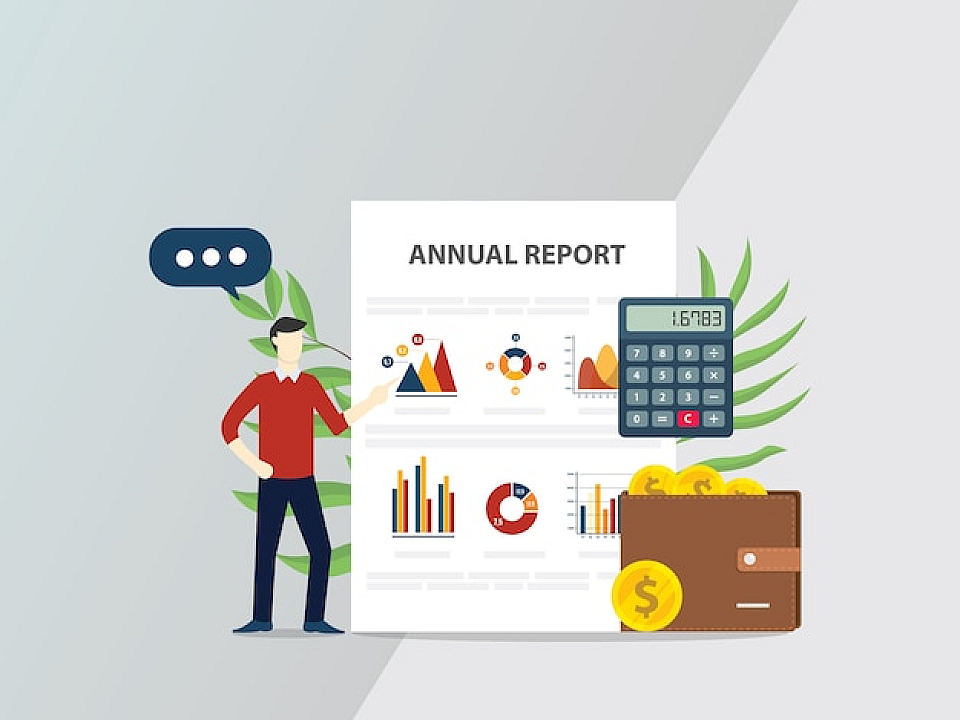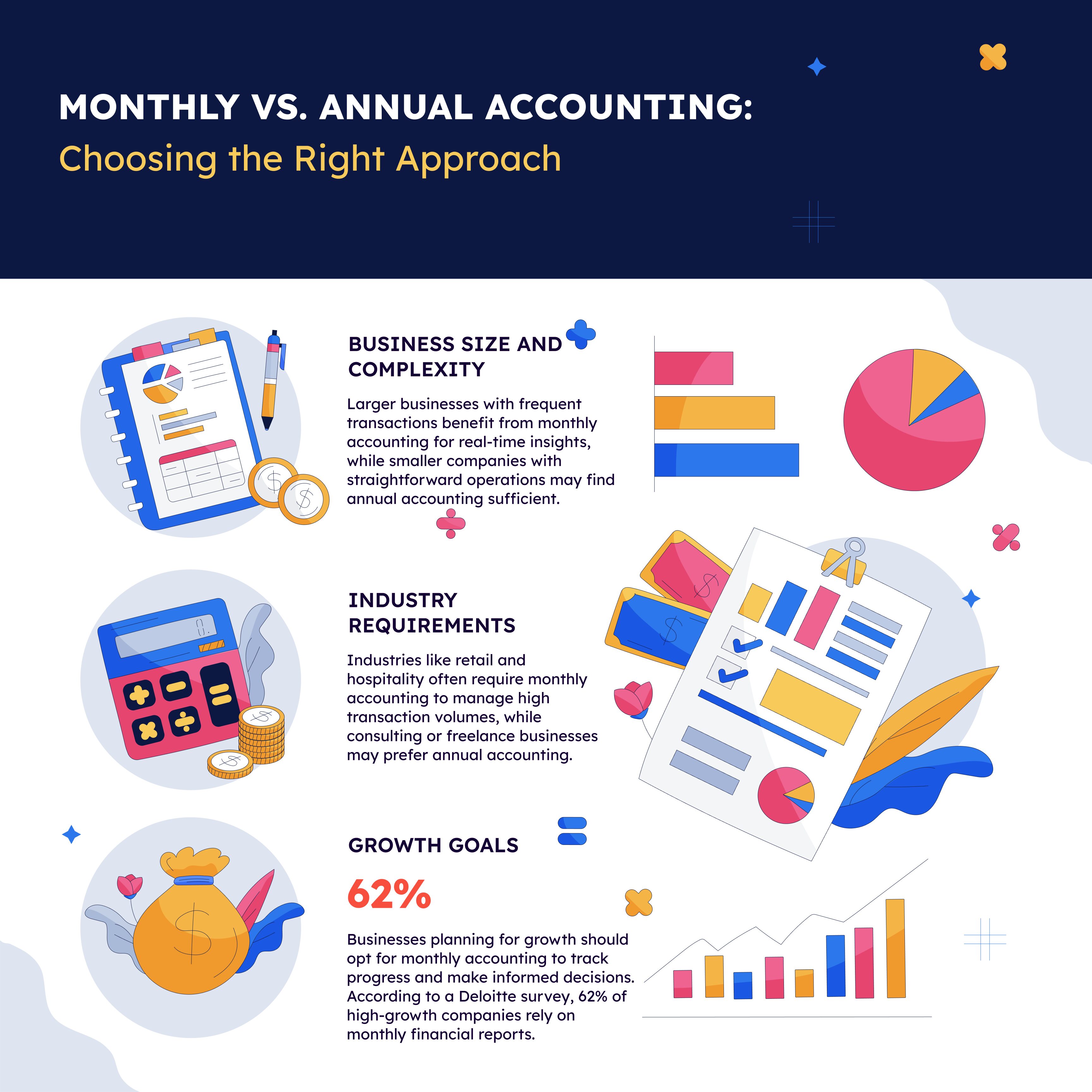Managing your business’s finances effectively is crucial for success, but choosing the right accounting approach—monthly or annual—can significantly impact your operations. Both methods offer distinct advantages depending on your company’s size, industry, and financial goals. Understanding the differences between monthly and annual accounting will help you make an informed decision. At Xerosoft Global, we provide expert guidance to ensure your accounting strategy aligns with your business needs and compliance requirements.

What Is Monthly Accounting?
Monthly accounting involves tracking and reconciling financial transactions on a monthly basis. This includes generating financial statements such as profit and loss reports, balance sheets, and cash flow statements. It is ideal for businesses requiring frequent insights into their financial performance.
Key Benefits of Monthly Accounting:
- Regular Financial Insights: Monthly reports provide a clear picture of revenue, expenses, and profitability. Businesses that review financial data regularly are 2.5 times more likely to meet their financial goals¹.
- Improved Cash Flow Management: Tracking finances monthly helps businesses monitor cash flow and address potential issues proactively.
- Compliance with Tax and Regulatory Deadlines: Regular updates ensure timely tax filings and compliance with financial regulations.

What Is Annual Accounting?
Annual accounting focuses on preparing financial reports and tax filings at the end of the fiscal year. While it requires less frequent updates, it involves a comprehensive review of the year’s financial activities.
Key Benefits of Annual Accounting:
- Lower Administrative Burden: Businesses with simple financial structures may find annual accounting sufficient.
- Cost-Effectiveness: Fewer updates mean reduced costs for businesses with minimal transactions.
- Simplified Tax Preparation: Annual accounting compiles all financial data into one comprehensive report for tax filings.
Monthly vs. Annual Accounting: Key Differences
Aspect | Monthly Accounting | Annual Accounting |
|---|---|---|
Frequency of Updates |
Monthly |
Annually |
Financial Insights |
Real-time, continuous updates |
End-of-year overview |
Cash Flow Management |
Proactive |
Reactive |
Suitability |
Dynamic, growing businesses |
Small businesses with simple finances |


Choosing the Right Approach
Selecting between monthly and annual accounting depends on several factors:

Business Size and Complexity
Larger businesses with frequent transactions benefit from monthly accounting for real-time insights, while smaller companies with straightforward operations may find annual accounting sufficient.

Industry Requirements
Industries like retail and hospitality often require monthly accounting to manage high transaction volumes, while consulting or freelance businesses may prefer annual accounting.

Growth Goals
Businesses planning for growth should opt for monthly accounting to track progress and make informed decisions. According to a Deloitte survey, 62% of high-growth companies rely on monthly financial reports².
How Xerosoft Global Helps
At Xerosoft Global, we understand that every business has unique financial needs. Our tailored accounting services ensure your business operates efficiently, whether you choose monthly or annual accounting.

Monthly Accounting Services:
- Detailed monthly financial reports.
- Cash flow monitoring and management.
- Regular compliance checks to meet tax deadlines.

Annual Accounting Services:
- Comprehensive end-of-year financial reporting.
- Tax preparation and filing.
- Financial insights to support long-term planning.
By partnering with Xerosoft Global, you gain access to seasoned accountants, cutting-edge technology, and customized solutions designed to help your business thrive.
Why Accuracy and Timeliness Matter
Regardless of the accounting method you choose, accuracy and timeliness are critical. Inaccurate or delayed financial reporting can lead to cash flow issues, missed tax deadlines, and even legal penalties. According to the IRS, businesses paid over $4.9 billion in penalties for non-compliance in 2022³.
How Xerosoft Global Ensures Accuracy:
Our rigorous processes and technology-driven solutions minimize errors and ensure your financial records are always up-to-date and compliant.

Which Approach Is Best for Your Business?
The choice between monthly and annual accounting depends on your business’s size, complexity, and goals. Monthly accounting is ideal for dynamic, growing businesses that need regular insights, while annual accounting suits smaller companies with straightforward operations.
At Xerosoft Global, we help you determine the best approach and provide the expertise to implement it seamlessly. Whether you need monthly updates or end-of-year reporting, we ensure your financial data supports your business’s success. Contact us today to learn more about our customized accounting solutions.
References:
- QuickBooks, “How Regular Accounting Can Boost Financial Success,”
- Deloitte, “The Importance of Financial Reporting for Growing Businesses,”
- IRS, “2022 Tax Gap Analysis,”

